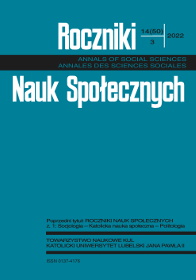Pandemiczne święta: typologia postaw Polek i Polaków wobec zmian w praktykach rodzinnych w kryzysie w świetle danych jakościowych
Abstrakt
Pandemia COVID-19 wymusiła zmiany w obszarze praktyk rodzinnych, w tym tych związanych z celebrowaniem świąt. Tradycyjne rytuały i utrwalone sposoby demonstrowania rodzinności musiały ulec natychmiastowym i często niechcianym modyfikacjom. Wyniki badania pokazują reakcje na te zmiany, które to objęły otwartość na nowe sposoby świętowania, ulgę związaną z pożegnaniem starych rytuałów, jak i negatywne oceny modyfikacji praktyk celebrowania. Analiza zmian rodzinnych praktyk związanych ze świętowaniem pozwoliła na stworzenie bardziej uniwersalnej typologii postaw wobec zmian praktyk rodzinnych w dobie kryzysów społecznych.
Bibliografia
Adams B. (2010), Themes and Threads of Family Theories: A Brief History, Journal of Comparative Family Studies, 41, nr 4, s. 499-505.
Aherfi S., Gautret P., Chaudet H., Raoult D., La Scola B. (2020), Clusters of COVID-19 associated with Purim celebration in the Jewish community in Marseille, France, International Journal of Infectious Diseases, 100, s. 88-94.
Aronson E., Wilson T., Akert R. (2003), Social psychology, New Jersey: Pearson.
Boccia S. (2021), Christmas Festivities and COVID-19: A Foreseeable Risk to Anticipate, Frontiers in Public Health, 8, s. 639-647.
Cheal D. (1999), The one and the many: modernity and postmodernity, The Sociology of the Family: A Reader, Oxford: Blackwell Publishers.
Finch J. (2007), Displaying Families, Sociology, 41, nr 1, s. 65-81.
Fraenkel P., Cho W.L. (2020), Reaching up, down, in, and around: Couple and family coping during the coronavirus pandemic, Family Process, 59, nr 3, s. 847-864.
Gawrońska M., Sikorska M. (2022), Rodziny na widoku – koncepcja demonstrowania rodzinności jako narzędzie użyteczne do analizowania życia rodzinnego, Studia Socjologiczne, nr 1(244), s. 137-164.
Gerhardt U. (1991), Typenbildung, [w:] U. Flick et al. (red.), Handbuch Qualitative Sozialforschung. Grundlagen, Konzepte, Methoden und Anwendungen, München: Psychologie Verlags Union, s. 435-439.
Giddens A. (1992), The transformation of intimacy: sexuality, love and eroticism in modern societies, Stanford: Stanford University Press.
Gulland J. (2020), Households, bubbles and hugging grandparents: Caring and lockdown rules during COVID-19, Feminist Legal Studies, 28, nr 3, s. 329-339.
Imber-Black E. (2020), Rituals in the time of COVID-19: imagination, responsiveness, and the human spirit, Family Process, 59, nr 3, s. 912-921.
Jamieson L. (1998), Intimacy: Personal Relationships in Modern Societies, Cambridge: Polity Press.
Kapoor V., Belk R., Goulding C. (2022), Ritual Revision During a Crisis: The Case of Indian Religious Rituals During the COVID-19 Pandemic, Journal of Public Policy & Marketing, 41, nr 3, s. 277-297.
Mariański J., Zaręba S.H. (2021), Rodzina jako wartość w czasie pandemii, Roczniki Nauk Społecznych, 49, nr 2, s. 5-21.
Marshall G. (1994), Oxford dictionary of sociology, Oxford: Oxford University Press.
McCarthy J., Edwards R. (2011), Key Concepts in Family Studies, London: Sage.
Miles M., Huberman A. (1994), Qualitative data analysis: An expanded sourcebook, London: Sage.
Morgan D.H. (1996), Family Connections: An introduction to family studies, Cambridge: Polity Press.
Morgan D.H. (2011), Rethinking Family Practices, Hampshire: Palgrave Macmillan.
Neale B. (2019), What is qualitative longitudinal research?, London: Bloomsbury.
Popyk A., Pustułka P. (2021), Transnational Communication between Children and Grandparents during the COVID-19 Lockdown: The Case of Migrant Children in Poland, Journal of Family Communication, 21, nr 3, s. 223-237.
Pustulka P., Buler M. (2022), First-time motherhood and intergenerational solidarities during COVID-19, Journal of Family Research, 34, nr 1, s. 16-40.
Pustułka P., Ślusarczyk M. (2016), Cultivation, compensation and indulgence: Transnational short-term returns to Poland across three family generations, Transnational Social Review, 6, nr 1-2, s. 78-92.
Pustułka P., Radzińska J., Kajta J., Sarnowska J., Kwiatkowska A., Golińska A. (2021), Transitions to Adulthood during COVID-19: Background and Early Findings from the ULTRAGEN Project, Youth Working Papers, 4, s. 1-65.
Saldana J. (2014), The Coding Manual for Qualitative Researchers, London: Sage.
Salner P. (2020), Jewish Holidays in the Time of the Corona Virus Pandemic in Slovakia, Occasional Papers on Religion in Eastern Europe, 40, nr 6, s. 110-121.
Seymour J., Walsch J. (2013), Displaying Families, Migrant Families and Community Connectedness: The Application of an Emerging Concept in Family Life, Journal of Comparative Family Studies, 44, nr 6, s. 689-698.
Shannon C.S. (2019), #Family: Exploring the Display of Family and Family Leisure on Facebook and Instagram. Leisure Sciences, New Brunswick: University of New Brunswick, s. 2-33 (online).
Singh R., Sim T. (2021), Families in the Time of the Pandemic: Breakdown or Breakthrough?, Australian and New Zealand Journal of Family Therapy, 42, nr 1, s. 84-97.
Wilding R. (2006), ‘Virtual’ intimacies? Families communicating across transnational contexts, Global Networks, 6, nr 2, s. 125-142.
Copyright (c) 2022 Roczniki Nauk Społecznych

Utwór dostępny jest na licencji Creative Commons Uznanie autorstwa – Użycie niekomercyjne – Bez utworów zależnych 4.0 Międzynarodowe.


